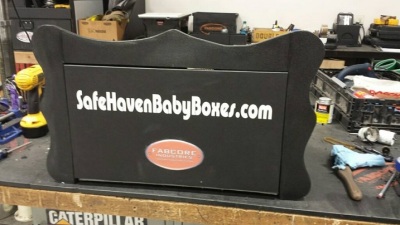Drop box for infants heads to Indiana Senate for approval

INDIANAPOLIS, Ind. (Christian Examiner) – A new mom could drop off her infant anonymously and safely in an oversized box in Indiana if a bill passed by the House is approved by the Senate and becomes law.
In an effort to avoid dangerous baby abandonment issues, a prototype is being developed for a container similar to a large bread box, with material in it that would protect an infant from heat or cold until a human arrives, which should be within minutes.
An alarm sounds when the drop box is opened and again when it closes, or a new mother could choose to push a buzzer when she drops off the baby to ensure her infant gets the best possible care.
"Indiana could be the first state to allow use of the baby boxes on a broad scale to prevent dangerous abandonments of infants if the bill, which unanimously passed the House this week, clears the state Senate," according to an Associated Press report. "Republican state Rep. Casey Cox and child-safety advocates say they're unaware of any other states that have considered the issue at the level Indiana has."
The concept even has a website up and running: www.SafeHavenBabyBoxes.com, and a toll-free telephone number: 888.510.baby (2229). The website includes information about the safe haven laws in each of the 50 United States.
Safe haven laws allow a new mother to turn her infant to an authorized receiver, which could be a hospital, church, fire station or several other locations, depending on the state, even to "a responsible adult" in two states. The child could range in age from 3 days (in 14 states) to 30 days (in 17 states) to a year (in two states) and other time frames, depending on the state.
The baby boxes would give mothers in crisis a way to surrender their children safely and anonymously, says Monica Kelsey, an Indiana firefighter and medic, an advocate for Safe Haven laws.
Critics suggest baby boxes would make abandonment too easy for mothers who might later regret a rash decision.
"These women love their children and they want to do what's best for the child, but they don't want to have their faces seen," Kelsey said. "The baby boxes take the face-to-face interaction out of the surrender and protects the mother from being seen."
Safe haven laws have resulted in more than 2,800 safe surrenders since 1999, according to the AP report. But more than 1,400 other children have been found illegally abandoned, nearly two-thirds of whom have died
Baby boxes originated in medieval times, the AP reported, when convents were equipped with revolving doors known as "foundling wheels." Unwanted infants were placed in compartments in the doors, which were then rotated to get the infant inside.
Some of what are known in China as "baby hatches" have been so overwhelmed by abandonments in recent years that local officials have restricted their use or closed them.
Kelsey stressed that the boxes should be viewed as a "last resort" and would include a toll-free number staffed 24 hours a day by a counselor who would first ask the caller to surrender the baby to a person.
"We're giving her the power to do what's right," Kelsey said. "We're hoping that these girls know that once they push that button, their baby will be saved. We want these locations to be able to accept a child if somebody ... thinks this is the only thing they can do."